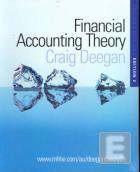Financial Accounting Theory : 2e édition
Deegan, Craig
Éditeur : MCGRAW-HILL
ISBN papier: 9780074716717
Parution : 2006
Code produit : 1225874
Catégorisation :
Livres /
Gestion /
Comptabilité /
Comptabilité financière
Formats disponibles
| Format | Qté. disp. | Prix* | Commander |
|---|---|---|---|
| Livre papier | En rupture de stock** |
Prix membre : 0,00 $ Prix non-membre : 0,00 $ |
*Les prix sont en dollars canadien. Taxes et frais de livraison en sus.
**Ce produits est en rupture de stock mais sera expédié dès qu'ils sera disponible.
Description
Book Description Presented in a logical sequence (refer to the diagrammatic overview of Financial Accounting Theory), the text begins with an overview of the various financial reporting decisions that entities typically face, and outlining regulated and unregulated reporting then evaluates and provides arguments for and against this regulation. Normative (prescriptive) theories are overviewed, international harmonisation of accounting is explored, and the development of new systems of accounting are considered along with how individuals and capital markets react to various corporate disclosures. The book concludes with an overview of various critical perspectives of accounting. Particular emphasis is given to: - Generating awareness that students & professionals should critically evaluate theories before accepting them. - Building an understanding of how theories are developed as a result of applying various value judgements - The role of issues such as culture and how cultural differences have typically been proposed as a reason to explain differences in accounting requirements - The political process involved in the setting of accounting standards. As it is divided into 12 chapters this text provides and ideal foundation for the average one semester unit that investigates financial accounting theory. Because it provides a balanced perspective of alternative and sometimes conflicting theories of financial accounting it also provides a sound basis for readers contemplating further research and develops habits of analytical reasoning and critical thinking























